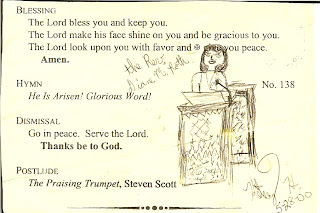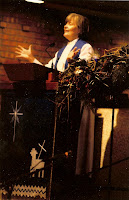I recently saw a picture of the meeting between Jesus and Nicodemus on a stained glass window. There they were, sitting in the dark, leaning in close to one another and talking about the mysteries of faith. They look like they are sitting outside in the dark, perhaps in a garden. Jesus is looking straight at Nicodemus, but Nicodemus has his eyes turned downward. Nicodemus is older, of course – but you can also tell which one is Jesus because he has a halo, a light circling his head. It reminded me of the verse at the beginning of John’s gospel: "The light shines in the darkness, and the darkness has not overcome it."
Nicodemus and Jesus meet at night. That’s a little detail from this story, but it’s important. Why do they meet at night, and not during the day? I have heard somewhere that rabbis often got together in the evening to have theological discussions. Maybe that’s what is happening. Jesus and Nicodemus are both busy men, after all; in the evening they have some time to get together and discuss some finer points of theology. Nicodemus is treating Jesus with respect by meeting with him at night. That’s one possible explanation for their meeting in the dark. But I think there might be more to it than that.
Think about it. Nicodemus is a man in the dark. We don’t know very much about him. Contrast him with the woman at the well, who we’ll meet next week. We learn a lot about her, some of it not so flattering! She’s out in the open, in more ways than one. But all we know about Nicodemus is that he is a Pharisee, a leader, and that he comes to Jesus by night. He is curious; we know that. We know he has some respect for Jesus. He begins by telling him, ""Rabbi, we know that you are a teacher who has come from God; for no one can do these signs that you do apart from the presence of God." So, he’s curious, he’s attracted to Jesus, and he has some questions – but we don’t know much else about him. We’re in the dark about him. And because we don’t know much about him, we’re free to imagine that he might be like us, in one way or another – that it might be you or me, coming to Jesus in the night and whispering our questions. Because – aren’t we curious sometimes, too? Don’t we have questions that we wish we could ask Jesus?
I remember when I was little, I shared a room with my sister. And it was often that after we said our prayers and turned out the lights, that we would begin to talk to each other and to share with each other, and to ask each other questions. "What do you think about this or that?" we would whisper in the dark, things we would never ask during the day. I’m not exactly sure why it is, but there is something that happens when the lights go out, and we can begin to talk to each other and ask questions and say things that we might never say during the day. That’s a little a little like what it might have been like for Jesus and Nicodemus, in the darkness. And maybe if we close our eyes right now, we can imagine Jesus sitting next to us, and think about what questions we would ask him. ....questions about the world, and why evil things happen, like the school shooting, questions about our lives, and why life might be hard for us right now, questions about our future, the future of our world. Close your eyes, for just a moment and think about a question you would have for Jesus if he were sitting next to you, like Nicodemus is sitting next to Jesus. (Pause.) Now you can open them.
Nicodemus is a man of darkness. We don’t know much about him. But he’s also a man of darkness because he doesn’t seem to get it, he doesn’t seem to understand about Jesus. Jesus makes an extraordinary statement to him, "No one can see the kingdom of God without being born from above," and Nicodemus doesn’t understand this statement. "What?" He asks. "How can a person who is old go back into his mother’s womb?" That’s obviously a ridiculous statement. No one can LITERALLY be born a second time. How can a wise person like Nicodemus so misunderstand Jesus’ statement? He’s in the dark, in more ways than one. He’s in the dark because he doesn’t quite understand what Jesus is telling him: about life and death, about blindness and seeing. What does it mean, to be "born from above?" And perhaps sometimes we feel the same way. This phrase, "Born from above," or "born again", in some translations, is unsettling to us. We might not know exactly what it means.
I have a birth certificate. I could say that this document proves that I was born – but that’s not exactly true. The birth certificate is really proof of who I am, what my name is. I’m alive, standing in front of you – and that’s the real proof that I was born. In the evangelical community, the term "born again" is used to refer to a specific conversion experience, and is somewhat like having a birth certificate. But it’s not the experience that counts, really. Just like it’s not the birth certificate that counts. It’s being alive that counts. To be "born from above" is to be alive to God. And like being born, it’s not something we can do, but something that God does for us. That’s why we associate it with baptism. Because in baptism, God claims us and makes us God’s children, and gives us God’s own life. The point is not having the baptismal certificate, though; the point is being alive to God, trusting the life God gives us. There’s something both attractive and frightening about that. It’s frightening because, like the wind, it’s not something we can ever totally understand or control. God's life in us is like the wind -- and we can't control it over even predict it.
Nicodemus is a man in the dark. And there’s one more reason, as well. Nicodemus is curious, but he’s also cautious. We get the impresssion at the end of the conversation that he just kind of fades away; he doesn’t decide yet to trust Jesus, to believe in him. He’s not quite a disciple, although as we move along through the Gospel of John we find out that Nicodemus does not quite go away. He’s on the sidelines, he’s still around, watching, and doing little things so that we can see that he’s sympathetic. He defends Jesus in John, chapter 7, against the other Pharisees. And in John 19, he is with Joseph of Arimathea when Jesus comes down from the cross. But here in this story – he’s still in the dark, still wondering. And yet.... "the light shines in the darkness, and the darkness has not overcome it."
Dr. Rachel Remen, tells a story in her book
Kitchen Table Wisdom, about a young man. This young man has survived after being stranded out in the snow for several days. He has hung on to life, and yet he has suffered severe frostbite. He begins to get better, but then there is a turn. One of his feet isn’t healing. It becomes clear that they will have to amputate this foot. But he is really stubborn and he is clear that he is going to keep his foot. He will not let them amputate no matter what. People plead with him, they reason with him, they argue with him, but to no avail. He is determined to keep his foot even though it might kill him. He’s stubborn. Finally, his fiancee becomes angry. She takes off the engagement ring that he has given her and he puts it on his little toe, the toe that is dead and needs to be amputated. She tells him angrily, "Marry your foot, if you love it so much!" And she storms out of the room. And when he sees the glittering diamond, shining on his dead toe, he sees something for the first time. He sees life – real life – and he sees love, real love. He sees love and life right there, shining in the darkness, and he decides to live.
"For God so loved the world, that he gave his only son, so that whoever believes in him may not perish but may have eternal life." That’s the light shining in the darkness. It is God’s love for us, shown in the face of Jesus, who is so patient with our questions, who sits next to us and looks right at us, even when we are in the darkness. It is God’s love for us, shown in the face of Jesus, who meets us in the darkness of our fear, and who gives us courage to trust him, and to follow him into the world. It is God’s love for us, shown in the face of Jesus, who meets us in the darkness of death and of loneliness and despair, and who gives us the light of life.
Close your eyes again, for a moment, and imagine that Jesus is sitting with you, looking at you, and knows what you are afraid of, knows what your questions are, knows what you struggle with . Close your eyes and imagine that Jesus is sitting next to you, the light of the world, a glittering diamond, telling you: "God so loved .... (your name)....that he gave the Son that whoever trusts him may not perish but have life, eternal and abundant." Then open your eyes and look at the cross. Look at the place where God was abandoned, but where God did not abandon us. Look at the glittering diamond of God’s love – hidden in that cross of torture. Look at the world’s evil, and God’s love, the light of the world.
Look at the cross – and live.
Amen














